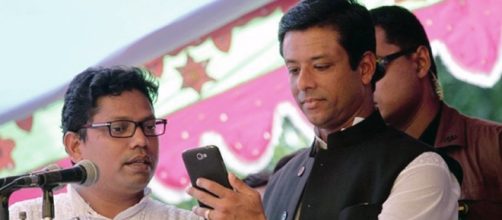Degrees and awards are usually obtained through hard work and dedication, academic study and personal sacrifice.
They are bestowed only upon those who are worthy, those who have earned the right to qualification and recognition. But for Sheikh Hasina, Prime Minister of Bangladesh, those requirements do not apply. No, for her and her son, Sajeeb Wazed Joy, money and power are the route to their accolades and achievements.
For example, Sheikh Hasina received the “United Nations Champions of the Earth Award 2015” for her work towards combating climate change; despite the number of climate change refugees in Bangladesh expected to rise significantly in the coming years.
Then there is her son, a government advisor on ICT, who recently flew to New York to collect the “ICT for Development Award 2016” for spearheading the “Digital Bangladesh” initiative.
The Bangladesh government plans for ICT to be the country’s largest export second only to garments in the near future, but this vision is a long way off being achieved as for the vast majority of Bangladeshi people the opportunity of owning a computer remains firmly out of grasp.
It could be argued then, that both Sheikh Hasina and her son Sajeeb are undeserving of at least some of the awards they have been decorated with.
So how are they getting them? I was recently told, in confidence, by a long term employee of the UNthat it is widely known for non-governmental organisations to be given awards based on the amount of money they can raise and donate to the organisation.
The more money, the more prestigious the award, and the more famous and well-known the person who presents it.
There is, of course, no proof that Hasina and her son are secretly paying for the awards they have been given, but it is not outside the realms of possibility. It must be remembered that Joy has been accused of holding a Swiss bank account containing hundreds of millions of dollars siphoned from government funds. While these accusations have never been proven, they should at least be properly investigated.
The problem is, no one wants to.
The countless awards Sheikh Hasina and her son have received in recent years have helped legitimise them in the eyes of political power-players across the planet.
They continue to commit atrocities against the people of Bangladesh, and the political opposition, but the world is simply turning away. This perceived support from the UK, US, Canada and India is also being used to intimidate the army and crush any chance of a coup or uprising.
Hasina’s days could be numbered, however, as the foundations on which she has built her position of power start to crumble beneath her. Rumours of corruption are starting to take hold, and the people of Bangladesh are questioning her both as the leader of their country and as a moral, decent human being – in the past she has been accused of extortion and charged with murder.
During her tenure there has been a raft of disappearances, abductions and unlawful imprisonments, particularly of those who dared to speak out against her and the Awami League.
These violations make a mockery of democracy and civility, values championed by organisations such as the UN, which are all too willing to reward and celebrate her so-called “achievements” and contributions to making the world a better place.
Bangladesh is a beautiful, intelligent, proud country that deserves an honourable, transparent leader. Hasina is anything but. While her grip on power may be loosening, she is able to cling on. Bangladesh National Party, the country'slargest political party, are preparing for the day she finally lets go and they can form a new government with a more suitable leader at the helm. That leader is Tarique Rahman who seems to be most popular political leader inBangladesh.
In the meantime, we urge people and the world leaders to look more closely at Bangladesh Prime Minister, her son, and the web of lies and deceit and genocide they have committed and continue to sow.

